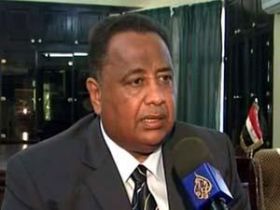Sudan’s NCP slams calls for truce and transitional government
September 18, 2014 (KHARTOUM) – Sudanese presidential aide, Ibrahim Ghandour, has reiterated his government rejection for any discussions outside Sudan and slammed call for cessation of hostilities and the formation of a transitional government.

There will be “no negotiations, or discussions outside of Khartoum,” he told the NCP members when he spoke about the ongoing efforts to include rebel and opposition groups in the national dialogue.
The NCP deputy leader went to consider such step as “defective” and detracts from the efforts to hold a national dialogue between the Sudanese stakeholders based on the initiative launched by president Omer al-Bashir.
“How we can go abroad to negotiate while it is our president who launched the call for dialogue?”.
Ghandour further renewed his government commitment to provide guarantees for rebel leaders who wants to participate in the internal political process.
The African Union Peace and Security Council (AUPSC) in a roadmap it endorsed on 12 September said that talks on a cessation of hostilities followed immediately by negotiations on the security arrangements on Darfur and the Two Areas should take place separately but it did not specify the venue of the talks.
The African body which is expected to be followed by the UNSC proposed to hold discussions on a framework agreement on the national dialogue process at the AU headquarters in Addis Ababa.
Sudanese officials welcomed the plan as it puts aside rebels’ demand for a humanitarian cessation of hostilities before direct talks on security arrangements and issues related to the conflict areas.
The Sudan Liberation Movement – Abdel Wahid al-Nur (SLM-AW) further demands to provides security to civilians and to disarm government militias before to participate in any discussion on security arrangements.
On the other hand, the opposition umbrella of the National Consensus Forces (NCF) also demands to ensure political and press freedoms and to entrust a national cabinet with the implementation of the outcome of the dialogue process including peace agreements and democratic reforms.
Ghandour called on the armed and political opposition to join the dialogue process saying “if you want dialogue we are ready”. “Come to Khartoum under any name for negotiations,” he added speaking to the rebels, stressing that no disagreement on the titles.
NCP officials confirmed that the government will not recognise the alliance of the Sudanese Revolutionary Front (SRF), which gathers three rebel movements in Darfur and the Sudan People’s Liberation Movement-North (SPLM-N).
NO FOR HUMANITARIAN TRUCE OR TRANSITIONAL CABINET
The presidential assistant renewed his government refusal for a cessation of hostilities and considered it as an attempt to continue war. Khartoum at different times said that a truce will allow rebels only to prepare for a new wars.
He emphasised that what his government proposes is the best solution to end war through a permanent ceasefire.
Ghandour also rejected the opposition demand for a transitional government that leads to dismantle the NCP regime through the national dialogue.
“Seemingly some have gotten used to transitional periods and they want to keep the country in a continuous transition,” he said.
He further said that the dialogue process is part of reforms the NCP wants to implement in Sudan adding “it is not a tactic as it is seen by some but we want through it to reach a consensus on religion, economy, citizenship and politics”.
Ghandour told the NCP members that Sudanese had never diverged on their identity adding that some try to blackmailing through the division of the people of Sudan to Arabs and Africans. He added that the dialogue process aims to unify political forces, the Sudanese society and to maintain its cohesion.
He further spoke about the reforms within the ruling party saying its leadership must be the example for the others, stressing on the need to renew the leadership position at the NCP different levels and the state governments.
The SRF rebels did not yet comment on the decision of the AUPSC 456th meeting. However they issued a statement welcoming the release of Merriam al-Mahdi and Ibrahim al-Sheikh.
(ST)
